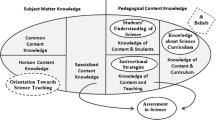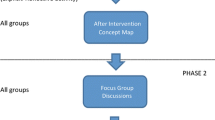Abstract
One method of addressing the shortage of science and mathematics teachers is to train scientists and other science-related professionals to become teachers. Advocates argue that as discipline experts these career changers can relate the subject matter knowledge to various contexts and applications in teaching. In this paper, through interviews and classroom observations with a former scientist and her students, we examine how one career changer used her expertise in microbiology to teach microscopy. These data provided the basis for a description of the teacher’s instruction which was then analysed for components of domain knowledge for teaching. Consistent with the literature, the findings revealed that this career changer needed to develop her pedagogical knowledge. However, an interesting finding was that the teacher’s subject matter as a science teacher differed substantively from her knowledge as a scientist. This finding challenges the assumption that subject matter is readily transferable across professions and provides insight into how to better prepare and support career changers to transition from scientist to science teacher.
Similar content being viewed by others
References
Alexander, P. A. (2003). The development of expertise: The journey from acclimation to proficiency. Educational Researcher, 32(8), 10–14.
Ball, D. L., Thames, M. H. & Phelps, G. C. (2008). Content knowledge for teaching: What makes it special? Journal of Teacher Education, 59(5), 389–407.
Baumert, J., Kunter, M., Blum, W., Brunner, M., Voss, T., Jordan, A., Klusmann, U., Krauss, S., Neubrand, M. & Tsai, Y.-M. (2010). Teachers’ mathematical knowledge, cognitive activation in the classroom, and student progress. American Educational Research Journal, 47(1), 133–180. doi:10.3102/0002831209345157.
Berry, B., Daughtrey, A. & Wieder, A. (2009). Teaching effectiveness and the conditions that matter most in high-needs schools: A policy brief. Chapel Hill, NC: Center for Teaching Quality.
Bransford, J. D., Brown, A. L. & Cocking, R. R. (Eds.). (2004). How people learn: Brain, mind, experience and school. Washington, DC: National Academy Press.
Bransford, J., Darling-Hammond, L. & LePage, P. (2005). Introduction. In L. Darling-Hammond & J. Bransford (Eds.), Preparing teachers for a changing world (pp. 1–39). San Francisco: Jossey-Bass.
Calderhead, J. (1981). Stimulated recall: A method for research on teaching. British Journal of Educational Psychology, 51(2), 211–217. doi:10.1111/j.2044-8279.1981.tb02474.x.
Darling-Hammond, L. & Richardson, N. (2009). Teacher learning: What matters? Educational Leadership, 66(5), 46–53.
Feiman-Nemser, S. (2003). What new teachers need to learn. Educational Leadership, 60(8), 25–29.
Gess-Newsome, J. & Lederman, N. G. (Eds.). (1999). Examining pedagogical content knowledge. Dordrecht: Kluwer.
Grossman, P. L. (1990). The making of a teacher: Teacher knowledge and teacher education. New York: Teachers College Press.
Hashweh, M. Z. (2005). Teacher pedagogical constructions: A reconfiguration of pedagogical content knowledge. Teachers and Teaching: Theory and Practice, 11(3), 273–292.
Hattie, J. (2009). Visible learning: A synthesis of over 800 meta-analyses relating to achievement. Oxford: Routledge.
Hill, H., Ball, D. L. & Schilling, S. (2008). Unpacking “pedagogical content knowledge”: Conceptualizing and measuring teachers’ topic-specific knowledge of students. Journal for Research in Mathematics Education, 39(4), 372–400.
Ingersoll, R. M. & Strong, M. (2011). The impact of induction and mentoring programs for beginning teachers: A critical review of the research. Review of Educational Research, 81(2), 201–233. doi:10.3102/0034654311403323.
Lawrence, C. & Green, K. (2005). Perceiving classroom aggression: The influence of setting, intervention style and group perceptions. British Journal of Educational Psychology, 75(4), 587–602. doi:10.1348/000709905x25058.
Lévi-Strauss, C. (1966). The savage mind. Chicago: University of Chicago Press. Original work published 1962.
Loughran, J., Berry, A. & Mulhall, P. (2006). Understanding and developing science teachers’ pedagogical content knowledge. Rotterdam: Sense.
Luft, J. A., Firestone, J. B., Wong, S. S., Ortega, I., Adams, K. & Bang, E. (2011). Beginning secondary science teacher induction: A two-year mixed methods study. Journal of Research in Science Teaching, 48(10), 1199–1224. doi:10.1002/tea.20444.
Luft, J. A. & Roehrig, G. H. (2007). Capturing science teachers’ epistemological beliefs: The development of the teacher beliefs interview. Electronic Journal of Science Education, 11(2), 38–63.
Morris, N. R. C. (Ed.). (2000). Attracting science and mathematics Ph.D.s to secondary school education. Washington, DC: National Academies Press.
Park, S., Jang, J.-Y., Chen, Y.-C. & Jung, J. (2011). Is pedagogical content knowledge (PCK) necessary for reformed science teaching?: Evidence from an empirical study. Research in Science Education, 41(2), 245–260. doi:10.1007/s11165-009-9163-8.
Patton, M. Q. (2002). Qualitative research and evaluation methods (3rd ed.). Thousand Oaks, CA: Sage.
Piburn, M. & Sawada, D. (2000). Reformed teaching observational protocol (RTOP): ACEPT Technical Report IN00-3. Retrieved 21/07/2013 from http://www.public.asu.edu/~anton1/AssessArticles/Assessments/Chemistry%20Assessments/RTOP%20Reference%20Manual.pdf.
Reilly, M. (2009). Opening spaces of possibility: The teacher as bricoleur. Journal of Adolescent & Adult Literacy, 52(5), 376–384.
Richardson, L. & Simmons, P. (1994). Self-Q research method and analysis, teacher pedagogical philosophy interview: Theoretical background and samples of data. Athens, GA: Department of Science Education, University of Georgia.
Rivkin, S. G., Hanushek, E. A. & Kain, J. F. (2005). Teachers, schools, and academic achievement. Econometrica, 73(2), 417–458.
Rockoff, J. E. (2004). The impact of individual teachers on student achievement: Evidence from panel data. The American Economic Review, 94(2), 247–252.
Roehrig, G. H. & Luft, J. A. (2004). Inquiry teaching in high school chemistry classrooms: The role of knowledge and beliefs. Journal of Chemical Education, 81(10), 1510–1516.
Saldaña, J. (2009). The coding manual for qualitative researchers. Thousand Oaks, CA: SAGE Inc.
Shulman, L. S. (1986). Those who understand: Knowledge growth in teaching. Educational Researcher, 15(2), 4–14.
Sternberg, R. J. & Horvath, J. A. (1995). A prototype view of expert teaching. Educational Researcher, 24(6), 9–17. doi:10.3102/0013189x024006009.
Trigwell, K. (2011). Scholarship of teaching and teachers’ understanding of subject matter. International Journal for the Scholarship of Teaching and Learning, 5(1), 1–7.
van den Heuvel-Panhuizen, M. (2008). Learning from “Didactikids”: An impetus for revisiting the empty number line. Mathematics Education Research Journal, 20(3), 6–31.
van Driel, J. H., Beijaard, D. & Verloop, N. (2001). Professional development and reform in science education: The role of teachers’ practical knowledge. Journal of Research in Science Teaching, 38(2), 137.
Watters, J.J. & Diezmann, C. M. (2012). Identity development in career-changing beginning teachers: A qualitative study of professional scientists becoming school teachers. Paper presented at the American Educational Research Association Annual Meeting, 13–17 April 2012, Vancouver Convention Center, Vancouver. Retrieved from http://eprints.qut.edu.au/49569/.
Watters, J. J. & Diezmann, C. M. (2013). Recruiting career-change professionals as teachers: The challenge of socialisation into teaching. Paper presented at the American Education Research Association Annual Conference April 27-May 1, San Francisco.
Author information
Authors and Affiliations
Corresponding author
Rights and permissions
About this article
Cite this article
Diezmann, C.M., Watters, J.J. THE KNOWLEDGE BASE OF SUBJECT MATTER EXPERTS IN TEACHING: A CASE STUDY OF A PROFESSIONAL SCIENTIST AS A BEGINNING TEACHER. Int J of Sci and Math Educ 13, 1517–1537 (2015). https://doi.org/10.1007/s10763-014-9561-x
Received:
Accepted:
Published:
Issue Date:
DOI: https://doi.org/10.1007/s10763-014-9561-x




